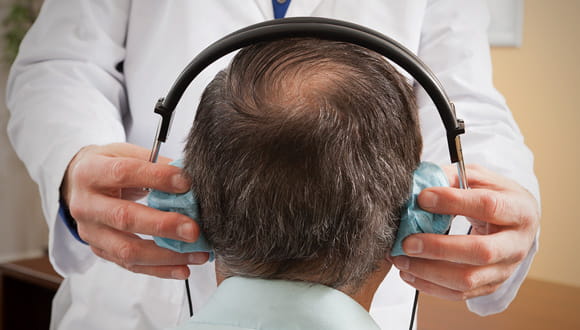It's one of your five basic senses, but how much do you really know about your hearing?
Is it normal? Are you doing things that might be damaging it? Would you even be able to tell if it was getting worse?
"Seeing an audiologist is a good way to check on your ear health and establish a baseline of your hearing," explains Dr. Rebecca Martin, an audiologist at Houston Methodist. "If you do have hearing loss, your audiologist can explain what it means for you moving forward and recommend ways to prevent further damage."
While anyone can benefit from having their hearing evaluated, there are certain signs that a hearing test is definitely in order.
5 signs it's time to see an audiologist
Sign 1: You're not hearing well in certain environments or situations. Whether you're turning the TV volume up louder and louder or dreading social situations because you don't always hear well enough to keep up with conversations, don't ignore changes you notice in your hearing.
Sign 2: Someone else has noticed a change in your hearing. Dr. Martin notes that it's not uncommon for hearing changes to first be noticed by a spouse, child, loved one or friend — not the person with hearing loss.
Sign 3: You have pain, pressure or drainage in your ears. These symptoms aren't just themselves uncomfortable — they reduce hearing. They're also typically a sign of an underlying ear problem that needs to be treated.
Sign 4: You've noticed a ringing in your ears. More formally called tinnitus, this early sign of hearing loss can also sound like static, buzzing, humming or cricket-like sounds.
Sign 5: You have a family history of hearing loss. Even if you're not having trouble hearing yet, having a family history of hearing loss is a good reason to establish a relationship with an audiologist and get an early baseline.
What happens during a hearing test?
At your first appointment with an audiologist, you'll be asked about your hearing and ear health history, as well as any symptoms you may be experiencing.
"A person's answers to these questions help us narrow in on whether something might be going on with their hearing or if we should recommend strategies for protecting their hearing moving forward," says Dr. Martin.
From there, a physical evaluation of your ear health and hearing begins.
"We look inside the ears to make sure there aren't any occlusions (blockages) due to ear wax or something else," explains Dr. Martin. "Next, we do a pressure test, applying a little bit of pressure in the ear to make sure that your eardrums are functioning as expected."
Then there's the actual hearing test, in which your hearing is measured as you listen to sounds of different pitches and volumes. Word recognition and comprehension are also assessed.
Each of these steps helps your audiologist determine whether your hearing is normal or not. If some degree of hearing impairment is present, the tests help reveal whether it's permanent or treatable.
What happens next if a hearing test uncovers hearing loss?
"In some cases, a hearing impairment is the result of an underlying issue that can be resolved, such as an ear infection or fluid in the ears," explains Dr. Martin. "If that's the case, your audiologist will likely refer you to an ENT doctor for treatment."
In some cases, though, hearing loss is due to permanent damage. An audiologist can help confirm or rule this out, as well advise you how severe it is and whether it might be time for hearing aids.
"If you know you're a candidate for hearing aids and you're struggling to hear in certain environments, I always say it's beneficial to be fit for them sooner rather than later," explains Dr. Martin. "However, the best hearing aids are the ones you'll actually wear, and I of course want you to feel ready before you start wearing them."
If hearing loss is very significant and/or hearing aids are no longer helping, an audiologist can also help you understand your options — including whether you might benefit from simply adjusting the fit of your hearing aid or if more advanced treatments are needed, such as cochlear implants.
You don't have to wait for hearing changes to benefit from seeing an audiologist, though
"It's never too early to see an audiologist to have your ear health checked and establish an early baseline of your hearing," says Dr. Martin.
Even if you haven't noticed any changes to your hearing yet, you might consider seeing an audiologist if you:
- Are 65+
- Have been exposed to loud noises at work
- Have a history of listening to very loud music
"Hearing loss can begin at various age ranges, from very young to very old," Dr. Martin adds. "There's a broad span."
It becomes increasingly common with age, however, and Dr. Martin says that around 65 is a good time to get your hearing checked if you haven't done so yet.
"And even before that time, if you have been exposed to loud music or very loud noise at work, it's never a bad idea to have your ears checked by an audiologist," recommends Dr. Martin.
Even if your hearing is normal, Dr. Martin points out that an audiologist can help you understand how to keep it that way — recommending tips for continuing to protect your hearing and reducing your risk of hearing loss.








